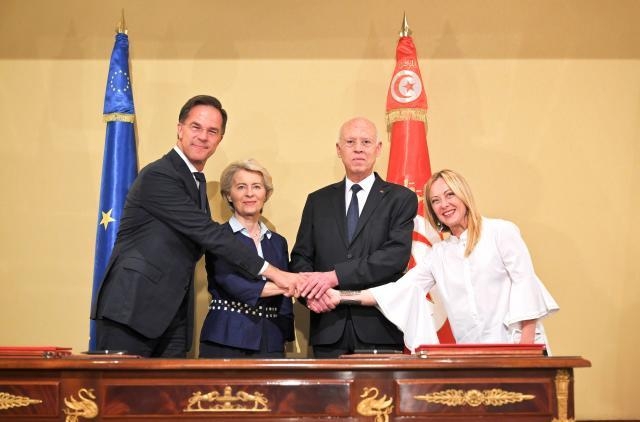A memorandum of understanding on a Strategic and Comprehensive Partnership between the EU and Tunisia was signed on Sunday in Tunis after a month delay but without any links to the lack of democracy in the country since the power grab by its president.
The memorandum (in French) was signed by European Commissioner for Neighbourhood and Enlargement Olivér Várhelyi and Tunisian Secretary of State of the Minister of Foreign Affairs, Migration and Tunisians Abroad, Mounir Ben Rjiba.
It was witnessed by European Commission President Ursula von der Leyen, the Italian Prime Minister Giorgia Meloni and the Dutch Prime Minister Mark Rutte, alongside the President of Tunisia, Kaïs Saied. As previously reported, they had met already on 11 June when they discussed economic aid to Tunisia and cooperation.
Their meeting resulted in the outline of a memorandum which needed to be finalized and adopted by the European Council by the end of June. This did not happen in time, officially because of a Muslim religious holiday.
The issue of democracy, rule of law and human rights in Tunisia was apparently not high on the agenda at the two meetings of the EU leaders (‘Team Europe’) and the Tunisian President. The signed memorandum lacks any reference to the democratic development, or rather backsliding, in Tunisia. But according to the Commission, the agreement opens a new chapter in the relations between the EU and Tunisia.
Democracy to be discussed
A senior Commission official said at a technical briefing on Monday that democratic development is an important element in the agreement and that the discussions will continue. He added that the agreement will bring Tunisia much closer to the EU through investments, energy cooperation and people-to-people contacts. It can also serve as a blueprint for agreements with other countries in EU’s neighbourhood.
While the implementation of the migration package will start immediately, other elements of the partnership still need to be discussed and requires an “implementation roadmap”.
An important step will be the “enhanced political and policy dialogue” within the EU-Tunisia Association Council which will meet by the end of 2023. It will offer an important opportunity to reinvigorate political and institutional ties, with the aim of addressing common international challenges together and preserving the rules-based order, the Commission says.
The memorandum of understanding covers five pillars or key axes: macro-economic stability, trade and investment, green energy transition, people-to people contacts, and migration. It will be implemented through the various strands of cooperation between the EU and Tunisia, following the relevant regulations and applicable procedures.
Dealing with migration crisis
Migration is the most important and sensitive issue in the agreement because of the undocumented migration to the EU across the Mediterranean Sea. It is also the part of the agreement which has been criticized by human rights organisations because of recent reports of Tunisia’s inhuman treatment of migrants.
Both parties marked their intention to develop a “holistic approach” to migration. They agreed that migration must be understood from the migration/development nexus, making it possible to highlight the advantages of migration in economic and social development, bringing people together and addressing the root causes of irregular migration.
They agreed to continue working together to address the challenges posed by the increase in irregular migration in Tunisia and the EU. They agreed to work to further improve the coordination of search and rescue operations at sea and the implementation of effective measures to combat migrant smuggling and human trafficking.
The EU will grant Tunisia €105 million in support to anti-smuggling, preventing loss of life at sea, enhanced cooperation on returns and strengthening border management, “in full respect of human rights, preventing irregular departures” from Tunisia. Support to returns refers both to readmission of Tunisians irregularly staying in the EU and irregular migrants staying in Tunisia to countries of origin.
The two parties also agreed to work towards the implementation of a Talent Partnership to promote legal migration, in the interest of both parties, based on the mutual needs of Tunisia and EU Member States.
M. Apelblat
The Brussels Times

